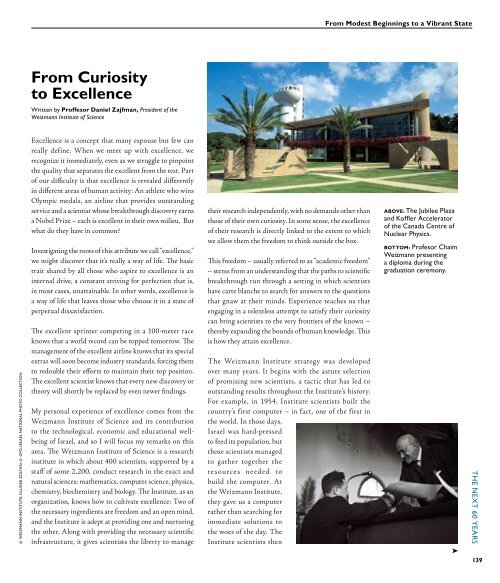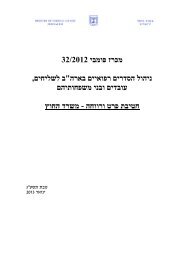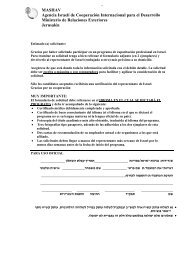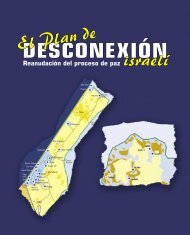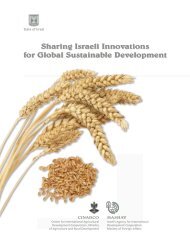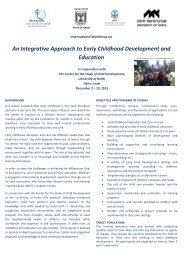The Future of Israel - Israel Ministry of Foreign Affairs
The Future of Israel - Israel Ministry of Foreign Affairs
The Future of Israel - Israel Ministry of Foreign Affairs
- No tags were found...
You also want an ePaper? Increase the reach of your titles
YUMPU automatically turns print PDFs into web optimized ePapers that Google loves.
From Modest Beginnings to a Vibrant StateFrom Curiosityto ExcellenceWritten by Pr<strong>of</strong>fesor Daniel Zajfman, President <strong>of</strong> theWeizmann Institute <strong>of</strong> Science© WEIZMANN INSTITUTE; KLUGER ZOLTAN, © GPO-ISRAEL NATIONAL PHOTO COLLECTIONExcellence is a concept that many espouse but few canreally define. When we meet up with excellence, werecognize it immediately, even as we struggle to pinpointthe quality that separates the excellent from the rest. Part<strong>of</strong> our difficulty is that excellence is revealed differentlyin different areas <strong>of</strong> human activity: An athlete who winsOlympic medals, an airline that provides outstandingservice and a scientist whose breakthrough discovery earnsa Nobel Prize – each is excellent in their own milieu. Butwhat do they have in common?Investigating the roots <strong>of</strong> this attribute we call “excellence,”we might discover that it’s really a way <strong>of</strong> life. <strong>The</strong> basictrait shared by all those who aspire to excellence is aninternal drive, a constant striving for perfection that is,in most cases, unattainable. In other words, excellence isa way <strong>of</strong> life that leaves those who choose it in a state <strong>of</strong>perpetual dissatisfaction.<strong>The</strong> excellent sprinter competing in a 100-meter raceknows that a world record can be topped tomorrow. <strong>The</strong>management <strong>of</strong> the excellent airline knows that its specialextras will soon become industry standards, forcing themto redouble their efforts to maintain their top position.<strong>The</strong> excellent scientist knows that every new discovery ortheory will shortly be replaced by even newer findings.My personal experience <strong>of</strong> excellence comes from theWeizmann Institute <strong>of</strong> Science and its contributionto the technological, economic and educational wellbeing<strong>of</strong> <strong>Israel</strong>, and so I will focus my remarks on thisarea. <strong>The</strong> Weizmann Institute <strong>of</strong> Science is a researchinstitute in which about 400 scientists, supported by astaff <strong>of</strong> some 2,200, conduct research in the exact andnatural sciences: mathematics, computer science, physics,chemistry, biochemistry and biology. <strong>The</strong> Institute, as anorganization, knows how to cultivate excellence: Two <strong>of</strong>the necessary ingredients are freedom and an open mind,and the Institute is adept at providing one and nurturingthe other. Along with providing the necessary scientificinfrastructure, it gives scientists the liberty to managetheir research independently, with no demands other thanthose <strong>of</strong> their own curiosity. In some sense, the excellence<strong>of</strong> their research is directly linked to the extent to whichwe allow them the freedom to think outside the box.This freedom – usually referred to as “academic freedom”– stems from an understanding that the paths to scientificbreakthrough run through a setting in which scientistshave carte blanche to search for answers to the questionsthat gnaw at their minds. Experience teaches us thatengaging in a relentless attempt to satisfy their curiositycan bring scientists to the very frontiers <strong>of</strong> the known –thereby expanding the bounds <strong>of</strong> human knowledge. Thisis how they attain excellence.<strong>The</strong> Weizmann Institute strategy was developedover many years. It begins with the astute selection<strong>of</strong> promising new scientists, a tactic that has led tooutstanding results throughout the Institute’s history.For example, in 1954, Institute scientists built thecountry’s first computer – in fact, one <strong>of</strong> the first inthe world. In those days,<strong>Israel</strong> was hard-pressedto feed its population, butthose scientists managedto gather together theresources needed tobuild the computer. Atthe Weizmann Institute,they gave us a computerrather than searching forimmediate solutions tothe woes <strong>of</strong> the day. <strong>The</strong>Institute scientists thenAbove: <strong>The</strong> Jubilee Plazaand K<strong>of</strong>fler Accelerator<strong>of</strong> the Canada Centre <strong>of</strong>Nuclear Physics.bottom: Pr<strong>of</strong>esor ChaimWeizmann presentinga diploma during thegraduation ceremony.➤the next 60 years139


